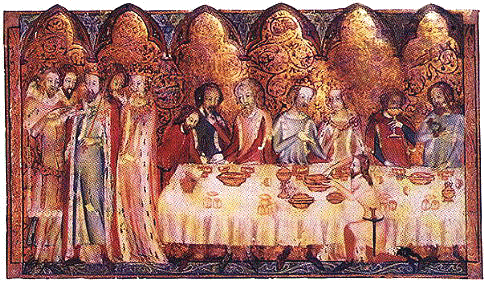....Now it's gone too far!
Let me tell you a story of "Rudolf the Red",
Most ancient tyrants, whom all people dread,
He ruled with iron-fisted fear, throughout his reign,
Though centuries have passed, legend's all that remains,
From his castle of stone, where he passed his decrees,
Around Northern Poland, which the winter did freeze,
His heart like his home both of stone, they were made,
Living the life of a tyrant, by his cold-steel blade,
Now Rudolf was cruel to animals too,
Tough venison especially he liked to chew,
So, on the coldest of winter days he would order,
His servants to hunt for deer which to slaughter,
On the coldest of winter days the hunt would begin,
With cruel weapons the animals would be ripped limb from limb,
Cold steel claws were the weapons Rudolf liked best,
No other weapon could pass his cruel test,
The villagers living in the valley below,
Living in conditions of cold freezing snow,
Would hear from the castle, these terrible screams,
Saying, "Surly, Lord Rudolf is SATAN, or so, it doth seems!",
Now, after each animal was brutally clawed to its death,
Rudolf would order tower bells to be rung,
And the skins of the deer, on the doorway be hung,
This was too much for some, this cruel decree,
So they raised a rebellion, just to set the deer free,
They raided his castle, and gave Rudolf the sack!,
With his own cruel claw, they clawed down his back,
Loudly they cheered, "Satan's been clawed, and given the sack!"
"No more is it freedom of which that we lack!"
So they tore down the castle, and built a tall pole,
Totally black, it was made from the hardest of coal,
A monument to every departed soul,
Now memories, can change, their meanings we neglect,
What we once thought was evil, may changes as we reflect,
Lost until now, was this unlikely tale,
But its meaning right now I'll tell, without fail,
So Rudolf the Red, we see now quite wrongly,
The villagers called him "Satan with the Claws",
Now what we call him, is simply "Santa Claus",
…Does that give you some sort of reason to pause?
His reign of terror, and brutality to those deer,
We simply remember as "Eight tiny Reign Deer",
Playing too, were bells after each deer he slew,
We remember as Sleigh bells, on a sleigh, which he flew,
Riding on his sleigh, with deer under reigns,
Led by Rudolf, with his bright nose of red,
Children who are rotten, bad to their soul,
Get their stockings at Christmas, filled up with coal,
Though, the villagers gave Rudolf "the sack",
We remember him now, just carrying his sack,
Filled up with gifts, and toys on his back,
His gifts, for children, he never seems to lack,
We remember Rudolf, who lived to the north,
And remember the North Pole, from which he came forth,
His castle long forgotten, his evil obscured,
Perhaps, do you find this tale absurd?
Perhaps, this story gives you something to ponder,
If you don't believe it, just asking those who remember,
Ask Comet, or Cupid, or Blitzen, or Donder,
They will say: "It's the truth, no reason to wonder!"
Maybe next time, I'll tell you why,
Rudolf didn't die, there's reason to sigh!
And don't worry either, there's no reason to cry,
...'Cause now Rudolf,
After all these years, he learned his lesson.
But he's still not a guy,
...With whom YOU should be messin'!
'Cause he now packs a pistol, ...a SMITH & WESSON!
Merry Christmas!
Labels: Santa Claus Christmas
 1. Schizophrenia --- Do You Hear What I Hear?
1. Schizophrenia --- Do You Hear What I Hear?










